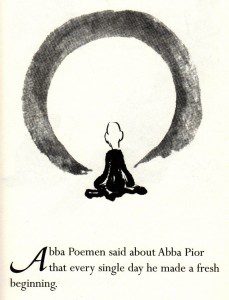I just learned that one of my fellow travelers on the great way, a Zen priest is going to be ordained into the independent sacramental tradition. It is important to add, without renouncing his Buddhist vows. I am endlessly fascinated by the Buddhist Christian encounter. And, actually, I find enormous value in the dialogue, and more in those places of conflict, and most of all in those attempts at fusion. Most of these will fail. Maybe all of them.
And yet I feel something rich within that strange and mysterious place. And compelling.
This meeting has been going on for a while now.
I was a little disappointed when I figured out Thomas Merton’s The Wisdom of the Desert was carefully selected to emphasize those areas of possible compatibility with Zen Buddhism. Reading more comprehensive collections such as Benedicta Ward’s magisterial Apophthegmata Patrum, the Sayings of the Desert Fathers, or even Helen Waddell’s more introductory The Desert Fathers, reveals a fascinating, wildly diverse, and even compelling version of an ascetic Christianity. And, yes, within that wildness there are moments that look quite “Zen.”
For instance, in Father Merton’s version.
Some elders once came to Abbot Anthony, and there was with them also Abbot Joseph. Wishing to test them, Abbot Anthony brought the conversation around to the Holy Scriptures. And he began from the youngest to ask them the meaning of this or that text. Each one replied as best he could, but Abbot Anthony said to them: You have not got it yet. After them all he asked Abbot Joseph: What about you? What do you say this text means? Abbot Joseph replied: I know not! Then Abbot Anthony said: Truly Abbot Joseph alone has found the way, for he replies that he knows not.
In addition to the questions of curation, I am also aware of the dangers of seeking meaning for one’s own spiritual way in the utterances of someone on another way. But, my goodness, sometimes. Sometimes.
When asked what is Zen, the Korean Zen master Seung Sahn said, “Only don’t know.” This is the great secret of Zen spirituality. And, frankly, the secret gateway for us all.
And so we find this message collected as case twenty in the Book of Serenity.
Dizang asked Fayen, “Where are you going?” Fayen replied, “I am wandering about aimlessly.” Dizang asked, “So, what do you think of this wandering about?” Fayan said, “I don’t know.” Dizang replied, “Not knowing is most intimate.”
It doesn’t really matter for our purposes who the players in this story are, although I find it interesting that they’re real historical people. Still, we can, and I believe it very helpful, to think of them as the part of our minds that believes it is in control and the part that knows better. “How are you doing?” I can ask myself. “Oh, wandering about,” I might reply. Particularly, right now. Interestingly, some versions of the text say “wandering about on pilgrimage.” Others, however, say “wandering about aimlessly.” These days, wrapped in not knowing, I prefer the second. Then pushed to respond to how I feel about this, I really, really understand that line “I don’t know.”
And, Christians get it. (Yes, not all Christians. The same can be said about many Buddhists…) We got it in that saying from the Desert Fathers. Here’s another Christian text that points in this direction, as well. The more common version for the title is the Cloud of Unknowing. It could just as easily, just as accurately be titled the Cloud of Not Knowing.
Not knowing. Only don’t know. The cloud of unknowing.
In my own experience, it means that while I like to plan and analyze, sometimes, sometimes in the most important places, I have to surrender my dreams of control, and let what is, be. For me it means shifting a bit, and letting my body guide me, rather more than my head. Right now, living within the bow, within the not knowing, I discover things.
Like in that place where Christianity and Buddhism meet. Uncomfortable. Powerful. A field of dreams.
My dreams hint at things, and I need to notice. My body’s aches and joys tell me things, and I need to notice. Chance encounters and fragments of conversation take on new and luminescent qualities, and I need to notice. Here the water bubbling up out of the well reveals itself, flowing freely, informing, nurturing, opening new ways. It’s something glorious, as well, of course, as unsettling, and occasionally even frightening.
Not knowing. Only don’t know. That cloud of unknowing.
This not knowing is most intimate. Beyond East and West. Found both in East and West. It reveals who I really am, it loosens my sense of boundaries, shakes off stories of control and certainty, and, and in all that; reveals a wide and wild world as my true home.













